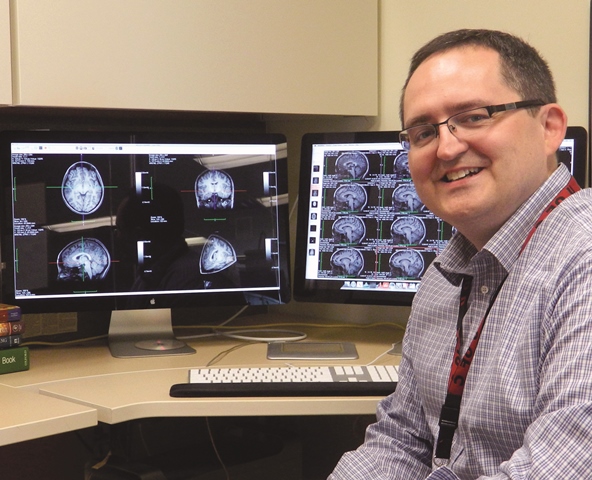Did you know only one out of two teens with depression responds to current frontline treatments?
In Calgary, that translates to as many as 5,000 youth in urgent need of something else to help them deal with depression.
Specialists at the Alberta Children’s Hospital are studying a very promising and non-invasive treatment for these teens and others just like them all around the world. A team led by Dr. Frank MacMaster is using #transcranial magnetic stimulation (TMS) to stimulate a section of the brain called the dorsal lateral pre-frontal cortex. It’s the part of the brain that regulates emotion, attention span and the ability to organize, plan and function as a responsible, productive adult. During TMS, a magnetic field targets a small section of the brain – pre-mapped by an MRI – and allows specialists to alter its level of stimulation.
“This part is like the boss of the brain,” says Dr. MacMaster. “TMS allows us to make it work more effectively to control symptoms. So far we are seeing some incredibly positive results.”
MORE: LET’S RID THE WORLD OF SUICIDE
More than three quarters of the participants have responded to the treatment and more than half of them have had their symptoms reduced by over 50 per cent. This is an incredible success, considering these patients haven’t responded to traditional treatments, such as anti-depressants and cognitive behavioural therapy.
While developing TMS as a successful therapy for depression is one goal, Dr. MacMaster’s team is simultaneously identifying factors that would help specialists predict how effective the treatment might be for individual patients. They have already found some potential indicators of how well patients will respond to TMS, including blood flow and the thickness of the cortex.
MORE: NEW PROGRAM DELIVERS TIMELY MENTAL HEALTH CARE FOR YOUTH
Unlike drugs, which can take up to six months to show their effectiveness in youth with depression, Dr. MacMaster is able to tell as early as the second week into TMS treatment whether it’s making a difference for a patient. And, he says, relative to long-term and multiple-medication regimes or leaving depression untreated, TMS is a significantly lower risk option. Given its success so far, it may one day become the frontline treatment for depression in youth.
Dr. MacMaster’s group was approached by experts at the Mayo Clinic for help on two new collaborative projects. The first is a large-scale trial – with sites at the Alberta Children’s Hospital, the Mayo Clinic and the University of Cincinnati – to seek Food and Drug Administration (FDA) approval for TMS as a treatment for teens with depression. The second is to use the trial as a framework for a multi-site study on biological predictors of TMS response rates in youth with depression. This could result in the validation of the first precision medicine identifier in psychiatry.


